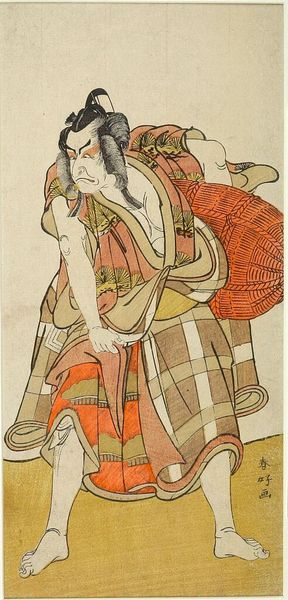
print, woodblock-print
#
portrait
# print
#
asian-art
#
ukiyo-e
#
figuration
#
intimism
#
woodblock-print
#
orientalism
#
genre-painting
Dimensions: H. 27 5/8 in. (70.2 cm); W. 4 3/4 in. (12.1 cm)
Copyright: Public Domain
Curator: I'm immediately drawn to the tranquility, or perhaps even boredom, captured in this image. It's as if time is suspended in this quiet domestic scene. Editor: We're observing Suzuki Harunobu’s woodblock print, "The Man Outside," dating from around 1760-1780. It’s a work currently housed at the Metropolitan Museum of Art. The dimensions are particularly interesting, creating a narrow, elongated field of vision. Curator: It's such a strange format! It feels almost voyeuristic, as if we’re peeking into someone's private world. Do you think that was Harunobu’s intention? Editor: Potentially. Harunobu uses strong vertical lines and rectangular forms—the window frame, the figure's silhouette—to compartmentalize the composition. Note how the restricted color palette, mostly muted browns and reds, enhances the intimacy. There is even a face peering in! Curator: Yes! A face framed in the doorway, what is happening there?! There's a lovely softness in the woman's face, contrasted against the harsh geometry. I can almost smell the tea brewing! Editor: Precisely, the print encapsulates several formal contrasts. The interplay between flatness and depth, the subtle gradations of color, all speak to Harunobu's mastery of the *ukiyo-e* tradition, but also he hints toward more naturalism. Also, the *ukiyo-e* as intimism interests me quite a bit. Curator: It's this strange blend of observation and interpretation—of glimpsing someone's private moment—that makes it feel incredibly modern. It makes me question what it truly meant to be "outside". Editor: Harunobu masterfully uses the material constraints of woodblock printing to evoke rich emotions and multilayered concepts. Through a precise, formalized approach, he offers us both a cultural snapshot and an invitation for contemplation. Curator: Yes. And for me, it all leads to ponder life’s constant shifting and transformation. We only view the work once. And our personal context has, I bet, colored our perspective today. Editor: Indeed. And a perspective of this beautiful print at that, may it endure.
Comments
No comments
Be the first to comment and join the conversation on the ultimate creative platform.













